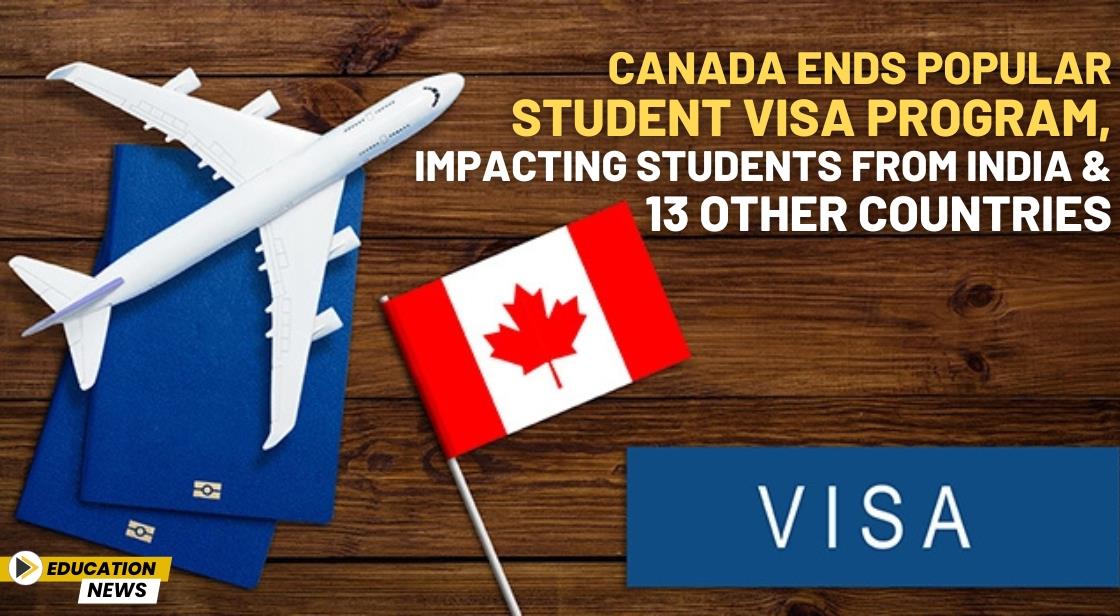Canada Ends Popular Student Visa Program, Impacting Students from India and 13 Other Countries

News Synopsis
The Canadian government has made a significant policy shift by ending the Student Direct Stream (SDS) program, a streamlined initiative that helped international students expedite their study permit applications. This decision, announced on November 8, 2024, is expected to affect lakhs of prospective students from countries like India, China, Pakistan, Brazil, and Senegal, among others, who had planned to study in Canada.
What Was the Student Direct Stream (SDS)?
The Student Direct Stream (SDS), which was launched in 2018, was designed to facilitate faster processing times for eligible international students applying to study at post-secondary institutions in Canada. The program initially included students from Antigua and Barbuda, Brazil, China, Colombia, Costa Rica, India, Morocco, Pakistan, Peru, Philippines, Senegal, St. Vincent and the Grenadines, Trinidad and Tobago, and Vietnam.
The SDS was praised for making the Canadian education system more accessible, significantly reducing wait times for study permit processing. However, in a sudden move, the Canadian government announced its discontinuation as of 2 PM (local time) on November 8, 2024.
The change also includes the Nigeria Student Express (NSE) program for Nigerian applicants. Students who had already applied under the SDS and NSE before the deadline will still have their applications processed under the respective programs.
Canada's Statement on the Discontinuation
The Immigration, Refugees and Citizenship Canada (IRCC) emphasized that the decision was part of a broader effort to "strengthen program integrity, address student vulnerability, and provide all international students with equal and fair access to the application process." According to the statement, while Canada’s goal is to enhance the study permit system, the change is not expected to negatively impact international students:
"The government is committed to giving all international students equal and fair access to the application process for study permits."
Impact on Future Applicants and New Application Process
With the termination of the SDS, future applicants from the affected countries will now need to go through the regular study permit process, which includes providing either a Provincial Attestation Letter (PAL) or a Territorial Attestation Letter (TAL). These letters are required to study at designated learning institutions (DLIs) in Canada.
The IRCC reassured students that despite the change, the new process would not "adversely affect" their applications. Nonetheless, the move raises concerns about the increased complexity and potential delays in the visa application process for students from several countries.
Diplomatic Context: Tensions Between Canada and India
This decision comes amid growing diplomatic tensions between Canada and India. The Canadian government has alleged that India was involved in the killing of Gurpatwant Singh Pannun, a Khalistani terrorist designated by India. New Delhi has vehemently denied the accusations, calling them “absurd” and politically motivated.
Recently, the Canadian government named Indian diplomats, including High Commissioner Sanjay Verma, as ‘persons of interest’ in the investigation. In response, India recalled these diplomats, marking a new chapter in the strained relations between the two countries.
In this context, India’s External Affairs Minister S. Jaishankar sharply criticized Canada's approach, accusing Ottawa of fostering extremism and separatism in the name of free speech, particularly in relation to Canada’s visa policies. He stated that Canada has been issuing visas to individuals with links to organized crime despite warnings from New Delhi.
In contrast, Canada's Immigration Minister Marc Miller expressed disapproval of Jaishankar’s comments, stating that "the Indian foreign minister is entitled to his opinion," but the allegations were inaccurate.
Conclusion
The ending of the SDS program marks a major shift in Canada's international student policy, particularly affecting students from India and 13 other nations. While the Canadian government claims the changes will not negatively impact students, the new process could add layers of complexity to the application system. Meanwhile, the ongoing diplomatic tensions between Canada and India provide a backdrop to this significant decision.









